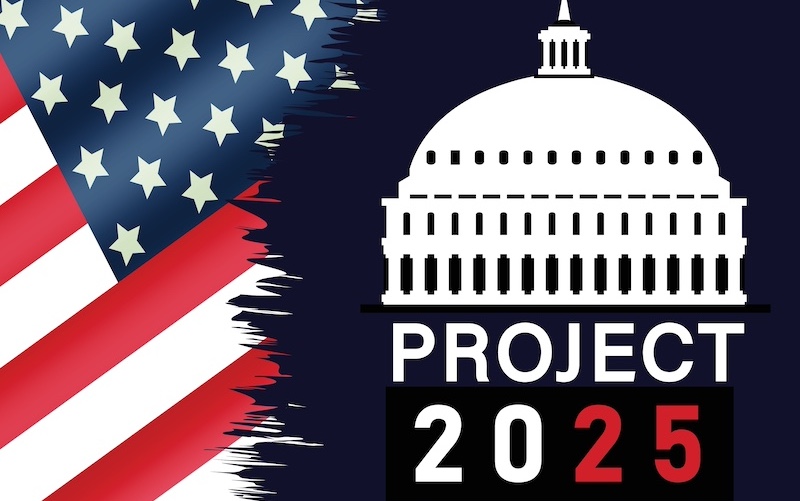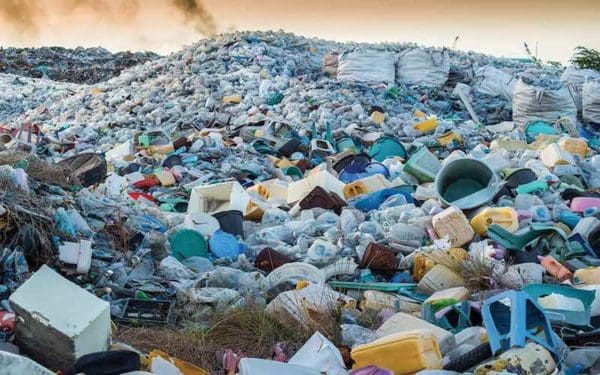
Updated – November 12, 2024
Although Donald Trump disavowed Project 2025 on the campaign trail, since his re-election, his closest allies are now admitting what we knew all along – Project 2025 is the agenda for the next four years, and they can’t wait to get started.
We can’t say we’ve been here before because, truthfully, we haven’t. We’re in uncharted territory for the future of our climate and so much more. But we’ve been preparing for this moment. When a Trump administration plans for draconian rollbacks and handouts to Trump campaign donors in the oil and gas industry, we turn to other levers of change to defend New England from future destruction. When Washington descends into chaos, we get to work in every New England state to make progress towards a cleaner future. And the truth is that much of the most meaningful changes we can make to save our future and defend against Project 2025 environment threats happen right here at home. They happen in conversations with neighbors, in state houses, in local meetings, town halls, and state governments. They’re already happening – with or without the approval of Donald Trump.
New England doesn’t need a Project 2025 agenda – we’re already hard at work on the project of building a better future. But to defend against the attacks we know are coming, it’s useful for us to know what we’re facing. Below is an outline of Project 2025 environmental proposals and threats. Let’s use it as a roadmap to forge a brighter path forward together.
Americans have made substantial progress in realizing a cleaner, healthier, more beautiful country. Thanks to the Clean Air and Clean Water Acts, our air and water are less polluted than they used to be. Because of the Inflation Reduction Act, we are on track to produce 43% less climate-damaging carbon pollution than in 2005. Thousands of animal species enjoy essential protections under the Endangered Species Act. Treasured public lands are protected for future generations because of the Antiquities Act.
Let’s contrast that to where we’ll be if Project 2025, the 922-page policy agenda written by the conservative Heritage Foundation, should ever become official government policy.
Project 2025 Environment and Climate Threats
First, the government will back away from its commitment to the environment. Even the term “climate change” will be stripped from federal documents. The Inflation Reduction Act (IRA) – the biggest plan to cut carbon pollution in United States history – will be repealed. According to Energy Innovation, a non-partisan energy and climate think tank, repealing the IRA would result in 2.7 billion metric tons more carbon in the air by 2030 compared to the current trajectory. That means our cleaner air will become dirtier, and climate change will escalate faster.
More pollution will cause more chronic illnesses and deaths while increasing the pace of climate change. Ramped-up climate change will lead to even more extreme storms. And, of course, we’ll be unprepared for that bad weather because Trump’s Project 2025 calls for eliminating the National Weather Service. (It will be “privatized.”)
When the inevitable drenching downpours inundate unprepared towns and cities, homeowners will be left to fend for themselves. That’s because Project 2025 would scrap the National Flood Insurance Program in favor of private insurers. (Don’t forget the program was created in the first place because private insurers didn’t want to insure high-risk properties.)
Antiquities Act Repealed
And what about those natural habitats we’ve protected for our children and innumerable species? The Project 2025 agenda calls for the repeal of the Antiquities Act under which they were created. What’s more, federal lands will be opened up for a slew of new oil and gas drilling.
In short, the Trump Project 2025 agenda, written as a blueprint for a new conservative administration, would eviscerate decades of hard-won environmental protections for the benefit of the wealthy few. The rest of us—and the country as a whole—would be much worse off because of it.
To avoid the wholesale gutting of environmental progress achieved painstakingly over decades, we must ensure that Project 2025 never gets implemented.
The Truth Behind Project 2025
The alleged “reforms” outlined in the Project 2025 agenda are no such thing. They are instead the fever dream of a radical conservative extreme. They are so extreme that one can’t help but ask—why? Why turn away from the country’s commitment to lowering carbon emissions, which will prevent 3,900 premature deaths annually from air pollution? Why reject the opportunity to boost our economy by $450 billion annually by 2030? Why allow 2.2 million jobs, many of them coming from clean energy, to evaporate into thin, dirty air? Or force consumers to pay an extra $7.7 billion in energy costs they wouldn’t have paid otherwise?
The answers to those questions are in the document itself. Project 2025 speaks bitterly of an “assault on the energy sector” as the government “uses its regulatory might to make coal, oil, and natural gas operations very expensive and increasingly inaccessible while forcing the economy to build out and rely on unreliable renewables.” It proclaims, “This approach has also been applied to pesticides and chemicals” as the government “pushes the ‘greening’ of agriculture and manufacturing, among other industrial activities.”
In other words, the authors resent the very government regulations that, for decades, have protected Americans’ health and well-being, namely those they perceive as jeopardizing private interests. It’s no coincidence that Project 2025 explicitly spotlights coal, oil, natural gas operations, and pesticide and chemical companies. These industries have lobbied heavily to keep the spigots flowing. While enjoying jaw-dropping profits today, they stand to lose money as the world moves to the clean energy necessary to ensure a livable planet for future generations. To keep that from happening, they’re wielding their influence to stop this progress while they can.
Turning Back the Page on Federal Oversight
And that’s the heart of the matter. At its root, Project 2025 is about wiping away federal funding and oversights designed to protect the public interest when they threaten corporate profits. The Trump Project 2025 agenda returns us to a past we know too well through books like Upton Sinclair’s The Jungle, published in 1905. Sinclair exposed gruesome, unregulated American slaughterhouses at the turn of the century, and his novel spurred on the creation of the modern regulatory state. We again saw what industry unbound looked like in 1969 when manufacturing companies were free to dump toxic and flammable substances into waterways, and rivers like Cuyahoga in Ohio caught fire. The Environmental Protection Agency was born in 1970 as a direct result. Since its creation, the EPA has vastly improved our air and water quality, even as new threats emerge. It remains a critical enforcer of polluting industries.
But that’s not how the Heritage Foundation sees it. Under Project 2025, the Environmental Protection Agency is at risk.
“The EPA has been a breeding ground for expansion of the federal government’s influence and control across the economy,” writes Mandy M. Gunasekara in Project 2025. Gunasekara was former chief of staff at the EPA. Apparently, she had very little respect for the agency she helped oversee.
Therein lies the crux of the matter. The Project 2025 agenda is written by policy wonks who don’t believe in government.
Wrong Policy at the Wrong Time
The problem with this “limited government” mode of thinking is that it doesn’t work. Especially today. Especially right now. In this age of rapid human-caused climate change that surprises even the scientists who predicted it, we desperately need an agile, proactive, and visionary government unafraid to push for bold climate action. What don’t we need? We do not need to disband the National Weather Service as more extreme storms brew. We do not need to shrink the EPA even as we regularly discover more toxic “forever chemicals” in our water and food supply. We do not need to give up on researching and implementing clean energy alternatives like offshore wind energy and solar power when those very alternatives will allow us to heat and power our homes at a long-term, lower, more stable cost that also doesn’t destroy the planet.
We’ve seen versions of this playbook before, and we’re prepared for it. We know how to fight back to ensure the protections that guarantee a safe and healthy environment – policies that most Americans support – remain intact. And even if the federal government should fall into the hands of Project 2025 proponents, we will stay on the case at the state and local level, working tirelessly to safeguard our climate and environment. The Heritage Foundation may be anxious to send us back to yesteryear’s smog-filled skies and polluted waters, but at CLF, we will fight to keep the environmental progress we’ve made on track.



